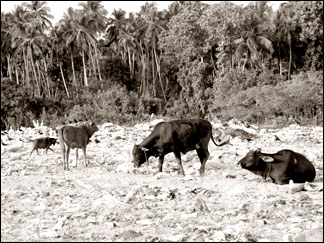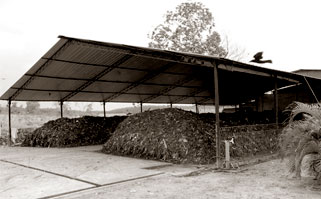Giant step towards sustainable SWM system
Pilisaru - National Solid Waste Management Programme:
by Indeewara Thilakarathne
[email protected]
|

Open dumping ground

Organic manure, a by-product of Biogas generation
|
As Sri Lanka enters the next phase of mass urbanisation, one of the
challenges that the nation faces is to devise a sustainable Solid Waste
Management system (SWM) which would be capable of coping with the ever
growing volume of solid waste.
By now, it has been proved that the Local Authorities (LA) such as
municipal councils, urban councils and Pradeshiya Sabhas can not alone
handle the growing volume of solid waste produced daily although SWM is
under the purview of local authorities.
To meet the challenge at national level, Ministry of Environment and
Natural Resources (MENR) has launched Pilisaru, the national solid waste
management programme with the objective of maximising re- utilisation of
resources discarded as waste and disposal of residue in an
environment-friendly manner.
One of the objectives of the programme is to galvanise the local
authorities to maintain sound SWM practices. In addition it encourages
local authorities to re-activate already defunct SWM programmes, assist
adapt SWM programmes and also take legal action against local
authorities that would not abide by the policy.
Under Pilisaru, a National Policy on Solid Waste Management (NPSWM)
is to be formulated in October 2008 together with a strategy to
implement the policy. What is often lacking is the implementation of
much pontificated policy and to obtain assistance of local authorities
to implement the policy.
Composting and bio-gas potentials
As most of the solid waste contains biodegradable waste which are
suitable for producing composting and generating biogas. According to
Jayawilal Fernando, the Project Manager CFA, Pilisaru, the programme
provides technical and financial assistance for the composting and
biogas generating programmes.
"Pilisaru will make a sea change in public perception of solid waste
and offers a sustainable solid waste management system for the country,
" said Jayawilal Fernando. So far Pilisaru has received 28 project
reports from local authorities and the Pilisaru also encourages public
and private sector collaboration in setting up composting and biogas
generating plants. In order to streamline the operation, waste
collection centres are set up in almost all local authorities and the
centres help encourage re-cycling process of waste.
Magnitude of the issue
In terms of creating waste, North and the Eastern Provinces are
second to the Western Province accounting for producing very large solid
waste.
In the Western province, a sizeble chunk of waste disposal is done by
the private sector. However, private sector does not stick to the set
standards and procedure and try to handle waste beyond its capacity. It
has been calculated that the annual production capacity of the compost
is about 100000 tones and besides avoiding possible harm by over-use of
chemical fertilizer, organic manure can reduce importation of urea
fertilizer by about one third, thus saving 1.6 billion of foreign
exchange.
Pilisaru has proposed to convert lands used for dumping solid waste
by local authorities into compost generating sites.
However, financial and technical assistance should be provided in
order to implement solid waste management strategies in a sustainable
manner. Therefore a package of incentives should be coupled with law
enforcement initiatives.
One of the seemingly intractable issues in the SWM in Sri Lanka is
open dumping. Unlike in conventional dumping sites, sanitary land-fling
is designed to minimize adverse effects associated with solid waste
disposal.
In order to change current solid waste disposal practices, it is
necessary to construct sanitary land-fill sites island wide in
identified localities.
How people are benefited
Pilisaru, the three years National Solid Management Project will
expect to yield several benefits in the areas of composting of waste,
waste recycling, waste disposal and employment generation.
In the first stage of Pilisara, 14 major composting plants will be
constructed in localities considering the gravity of the problem in the
area and availability of land for the purpose.
This will cover 50 local authorities and expected to handle an
estimated 1,085 MT of waste daily and the annual compost production will
be 60,272 MT, yielding an annual profit of 130 million.
In addition, the project will fund operation of small scale
composting projects which will produce 10,000 MT of compost annually. It
is expected that chemical fertilizer usage can be reduced, at least, by
33,000 MT, saving foreign exchange equivalent to Rs. 1.6 billion
annually.
Some of the benefits the re-cycling of solid waste include saving of
foreign exchange to the tune of around Rs. 1.25 billion currently spend
on importing plastic raw materials by re-cycling discarding plastic
materials. According to action plan, recycling of used paper and
introduction of school waste banking system will be implemented. School
children will encourage earning and saving money by selling waste paper.
The salient benefits amassed by the student waste banking system
include purchasing of waste paper at the rate of Rs. 4.50 per kg by
waste paper collectors, students receiving an exercise book for every 10
kg of the waste paper sold to the collector, each classroom will receive
a paint tin when 1,000 Kgs of waste paper is handed over to the
collector.
Significant reduction of environment pollution caused by haphazard
disposal of waste along side roads, wetlands, lowlands is a direct
outcome of the solid waste disposal. This will, in addition, reduce the
risk of spreading diseases such as dengue and malaria. According to a
report by the UNEP there were 41 open dumping sites within the Greater
Colombo Area by the year 2001.
The Bluemendhall and Madampitiya waste dumping sites used to dispose
waste generating in Colombo MC area and suburbs has been causing a great
impact to the aesthetic value of the Capital city in additions to its
impacts on the public & health and the surrounding ecosystems.
Study by Central Environment Authority has found out that there are
236 open dumping sites located in Colombo, Kalutara, Galle, Matara,
Hambantota, Kandy, Mathale, Nuwara-Eliya and Kegalle districts.
Under the Pilisaru, number of open dumping sites will be reduced to
10. The project will undertake to implement on the ground several waste
disposal facilities in the country and take necessary actions to phase
out haphazard waste disposal.
In terms of employment generation, it is expectedto generate at least
1000 direct employment opportunities with the setting up of compost
plants at Kolonnawa, Mahawatta (Meerigama), Maligawatta (Dompe), Waga,
Pohorawatta (Kalutara), Gohagoda (Kandy), Udunuwara (Kandy),
Anuradhapura, Medirigiriya, Oluvil, Pompeimadu (Vaunia), Karkaitheevu (Jaffna)
and landfills at Malamulla (Panadura), Maligawatta (Dompe),
Gonadikawatta (Kandy), Nuwaragampalatha East (Anuradhapura),
Madirigiriya (Polonnaruwa), Waga (Pelpola), Hikkaduwa (Galle), Oluvil (Ampara),
Pampaimadu (Vavuniya), Karkaitheevu (Jaffna).
In addition to the direct benefits, Pilisaru yield host of other
benefits in terms of significantly reducing current dependency on fossil
fuel for power generation by generating electricity through biogas which
produces organic manure and also reduces harmful effect of use of
chemical fertilizer.
However, the project success is by and large dependent on translating
the lofty goals into reality by concerted effort and rigorous monitoring
and evaluation mechanism on the part of all stake holders in the
project.
Public awareness and participation is vital to ensure the smooth
implementation of Pilisaru.
It is the fervent hope of the nation that Pilisaru will, eventually,
lead to the formation of sustainable solid waste management system that
is capable of coping with the increasing volume of waste.
****
Objectives, locations and scope
Objectives
* To ensure proper conservation of resources and proper SWM
* To create awareness regarding SWM issues to relevant personnel and
to improve their skills.
* Implementation of SWM projects
* Monitoring of SWM programmes
* Providing facility to facilitate SWM
* Provision of necessary financial facilities for SWM
* Establishment of Waste Recycling Banking System (A bank would
collect waste
* from account holders and amount equal to the value of the waste
would be credited the bank accounts)
* Legal action for Local authorities which do not dispose garbage in
the proper manner.
Scope
Pilisaru covers household, commercial, market, institutional and
industrial solid wastes as well as waste produced in public places owned
by the Municipal Council.
* Collection of particulars regarding disposal of solid waste by LAs
* Evaluation of Project proposals
* Establishment of Waste Recycling Bank System
* Establishment of waste collecting centres
* Technical Support, Institutional strengthening and capacity
building needs of special emphasis on Local Authorities will be
addressed to promote waste management practices
* Arrangements will be made for devising and adopting instruments to
encourage or enforce prevention and reduction of waste.
* Establish proper recycle mechanism and collection network for
metal, plastic or glass, cardboard and paper
* Establishment of Compost plants at Local Authority level.
* Construction of low cost sanitary land fills for the local
authorities for disposing residual waste.
* Promoting Home Composting
* Monitoring and taking Legal action for LAs that do not carry out
proper SWM. |
